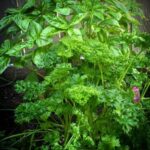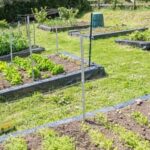Are spiders good for vegetable gardens? When it comes to maintaining a thriving vegetable garden, the role of insects and pests is a crucial factor to consider.
While some may view spiders as unwanted visitors in the garden, they actually play a significant role in helping to maintain a healthy and pest-free environment. In this article, we will delve into the benefits of having spiders in your vegetable garden, common misconceptions about these arachnids, and how they contribute to natural pest control methods.
In any vegetable garden, the presence of insects and pests can pose a threat to the health and productivity of the plants. This is where spiders come into play as important allies in controlling these unwanted intruders. Not only do spiders help to keep insect populations in check, but they also contribute to the overall balance of the garden ecosystem.
One common misconception about spiders in vegetable gardens is that they are harmful or dangerous. However, many species of spiders are beneficial and pose no threat to humans. In fact, by understanding their role and learning how to support them in your garden, you can effectively harness their natural pest control abilities while maintaining a harmonious environment for both plants and animals.
The Benefits of Having Spiders in Your Vegetable Garden
Spiders are often misunderstood and feared creatures, but they actually play a crucial role in maintaining the balance of ecosystems, including vegetable gardens. Here are some of the benefits of having spiders in your vegetable garden:
1. Pest control: Spiders are natural predators to many common garden pests such as aphids, caterpillars, and beetles. By keeping spider populations healthy in your garden, you can significantly reduce the need for chemical pesticides that can be harmful to both humans and the environment.
2. Ecosystem balance: Having a diverse population of insects and arachnids, including spiders, in your vegetable garden creates a more balanced and resilient ecosystem. This diversity helps to prevent any one species from becoming too dominant and causing imbalances that could harm your plants.
3. Reduce plant damage: With their ability to catch and consume pests, spiders can help protect your vegetable plants from being damaged or destroyed by destructive insects. This can lead to healthier, more abundant harvests without the need for excessive intervention.
Incorporating spider-friendly practices into your gardening routine can help support these beneficial creatures and create a thriving ecosystem in your vegetable garden.
– Plant native flowers around your garden to attract a variety of insects for spiders to feed on.
– Avoid using chemical pesticides and herbicides that can harm spider populations.
– Provide shelter such as rocks, logs, or mulch for spiders to hide during the day.
– Embrace the presence of webs as a sign of a healthy ecosystem rather than immediately removing them.
By following these tips, you can create an environment that supports spiders and other beneficial insects while reaping the rewards of reduced pest damage in your vegetable garden.
Common Misconceptions About Spiders in Vegetable Gardens
Many people have a fear of spiders and assume that they are harmful creatures that should be avoided at all costs, especially in vegetable gardens. However, this is a common misconception as spiders actually play a vital role in maintaining the balance of the ecosystem within your garden. Spiders are natural predators that help control the population of harmful insects and pests that can damage your vegetable plants.
One common misconception about spiders in vegetable gardens is that they will harm humans or pets. While it’s important to exercise caution and avoid getting bitten by certain species of spiders, the majority of spider species found in gardens are harmless to humans and pets. In fact, they can actually help protect your garden from pests like aphids, caterpillars, and other insects that can wreak havoc on your precious vegetables.
Another misconception is that all spiders create messy webs that will make your garden look untidy. The reality is that not all spider species create visible webs, and even those that do can actually contribute to keeping pest populations under control. Additionally, some spiders prefer to hunt their prey instead of using webs, so their presence may not even be noticeable to the naked eye.
Spiders are an important part of the natural pest control system in vegetable gardens and should be welcomed rather than feared or eliminated. By understanding their beneficial role and taking steps to attract and support them in your garden, you can create a balanced ecosystem without relying on harmful chemical pesticides.
How Spiders Help Control Garden Pests
Spiders are incredibly beneficial for vegetable gardens as they play a crucial role in controlling garden pests. These arachnids are natural predators that help keep insect populations in check, reducing the need for chemical pesticides. Spiders feed on a wide variety of insects including aphids, caterpillars, beetles, and other pests that can cause damage to your vegetable plants. By having spiders in your garden, you can create a balanced and healthy ecosystem that supports natural pest control.
One of the main ways spiders help control garden pests is by catching and consuming insects in their webs. This not only reduces the number of pests in your garden but also helps prevent infestations that could potentially damage your vegetable crops.
In addition to catching insects in their webs, some spider species actively hunt and capture pests, further contributing to pest control efforts. This proactive approach taken by spiders can significantly decrease the presence of harmful insects in your vegetable garden.
Research has shown that spiders are highly effective at reducing pest populations in agricultural settings. A study published in the Journal of Applied Ecology found that fields with higher spider densities had lower pest numbers compared to fields with lower spider populations. This demonstrates the important role that spiders play in natural pest management and highlights their potential impact on maintaining crop health. Embracing these helpful arachnids can lead to sustainable gardening practices that benefit both plants and the environment.
| Beneficial Spider Species | Contribution to Pest Control |
|---|---|
| Wolf Spiders | Active hunters; feed on various garden pests such as caterpillars and beetles |
| Orb Weavers | Create large webs to catch flying insects like moths and flies |
| Jumping Spiders | Agile hunters; prey on aphids, mites, and other small pests |
Types of Spiders That Are Beneficial for Vegetable Gardens
Spiders are an essential part of the ecosystem and can play a crucial role in controlling pests in your vegetable garden. There are several types of spiders that are particularly beneficial for vegetable gardens, and it’s important to understand their characteristics and behavior in order to encourage their presence.
Here are some types of spiders that can be beneficial for your vegetable garden:
- Jumping Spiders: These agile hunters have excellent eyesight and are known for actively seeking out and preying on garden pests such as aphids, caterpillars, and beetles.
- Orb Weaver Spiders: These distinctive spiders create spiral-shaped webs to catch flying insects like flies, mosquitoes, and moths. Their presence can help reduce the population of nuisance insects in your garden.
- Crab Spiders: These ambush predators don’t spin webs but instead wait patiently to capture prey that comes within reach. They are particularly effective at hunting bees, wasps, and flies.
It’s important to remember that not all spiders in your garden will be beneficial for pest control. Some species may not actively prey on garden pests or could even pose a threat to other beneficial insects. Therefore, it’s essential to promote a diverse population of spider species in your vegetable garden to achieve effective pest management while maintaining ecological balance.
Natural Pest Control Methods vs Chemicals
When it comes to pest control in vegetable gardens, many gardeners are faced with the decision of whether to use natural pest control methods or chemicals. Both options have their advantages and disadvantages, but an increasing number of gardeners are turning to natural pest control methods for a variety of reasons.
Advantages of Natural Pest Control
Using natural pest control methods in your vegetable garden is beneficial for a number of reasons. Firstly, it eliminates the need for potentially harmful chemical pesticides that can have negative effects on both human health and the environment. Additionally, natural pest control methods help maintain the balance of the ecosystem within your garden by allowing beneficial insects and animals to thrive alongside your vegetables.
Disadvantages of Chemical Pest Control
Chemical pesticides pose several potential risks when used in vegetable gardens. Not only can they harm beneficial insects such as bees and butterflies, but they can also contaminate soil and water sources. Furthermore, there is a risk of pesticide residue remaining on the vegetables after harvest, which can be harmful if ingested. These drawbacks have led many gardeners to opt for more natural alternatives.
Tips for Attracting and Supporting Spiders in Your Vegetable Garden
Attracting and supporting spiders in your vegetable garden can be beneficial for controlling pests and promoting a healthy ecosystem. Here are some tips to encourage spiders to make themselves at home in your garden.
Plant Diverse Vegetation
One way to attract spiders to your vegetable garden is by planting a diverse array of vegetation. Different types of plants can attract a variety of insects, which in turn will draw spiders looking for a meal. Consider incorporating flowers, herbs, and even certain weeds into your garden to create a more inviting environment for spiders.
Provide Shelter
Spiders need shelter to hide from predators and harsh weather conditions. You can provide them with hiding spots by adding mulch, rocks, or wooden debris to your garden. These hiding spots will not only attract spiders but also provide them with the necessary cover they need to thrive.
Avoid Using Pesticides
Using pesticides can harm the beneficial spider population in your vegetable garden. Instead of using chemicals to control pests, consider using natural pest control methods such as introducing predatory insects or manually picking off pests. This will help maintain a healthy ecological balance in your garden and support the spider population.
By implementing these tips, you can create an environment in your vegetable garden that is attractive and supportive for spiders. Doing so can contribute to natural pest control and promote a thriving ecosystem where spiders play an important role in maintaining the health of your plants.
Potential Risks and Drawbacks of Having Spiders in Your Vegetable Garden
In conclusion, spiders can be incredibly beneficial to vegetable gardens due to their role in natural pest control. As discussed in the earlier sections, having spiders present in your garden can help to keep insect populations in check, reducing the need for harmful chemical pesticides. In addition, some types of spiders also directly feed on common garden pests, further contributing to a healthy and thriving vegetable garden.
While the presence of spiders is generally advantageous for vegetable gardens, it is important to acknowledge the potential risks and drawbacks as well. Some gardeners may have concerns about the presence of venomous spiders or simply feel uncomfortable being around these arachnids. However, with proper knowledge and understanding, it is possible to coexist with spiders in a vegetable garden safely.
Ultimately, when considering whether spiders are good for vegetable gardens, it is important to weigh their benefits against any potential concerns. By implementing natural pest control methods and creating a welcoming environment for beneficial spiders, gardeners can harness the advantages that these arachnids provide while minimizing any potential drawbacks. In this way, a healthy balance can be maintained in the vegetable garden, allowing both plants and beneficial insects like spiders to thrive.
Frequently Asked Questions
Should I Leave Spiders in My Garden?
Spiders can actually be beneficial in your garden as they help control the population of other pests like aphids, mosquitoes, and flies. They prey on insects that may damage your plants, so leaving spiders in your garden can contribute to a more balanced ecosystem.
Are Spiders Good for Tomato Plants?
Spiders are generally good for tomato plants because they feed on insects that can harm the plants. By keeping the pest population in check, spiders help protect the tomato plants from potential damage caused by these insects. This makes them a natural form of pest control in the garden.
How Do I Keep Spiders Out of My Vegetable Garden?
To keep spiders out of your vegetable garden, you can start by removing their hiding spots such as piles of leaves or debris. Regularly clean and tidy up your garden to deter them from settling in. Additionally, you can use natural spider repellents like citrus peels or essential oils to discourage them from coming into your garden area.

If you’re looking to get into vegetable gardening, or are just looking for some tips on how to make your current garden better, then you’ve come to the right place! My name is Ethel and I have been gardening for years. In this blog, I’m going to share with you some of my best tips on how to create a successful vegetable garden.





